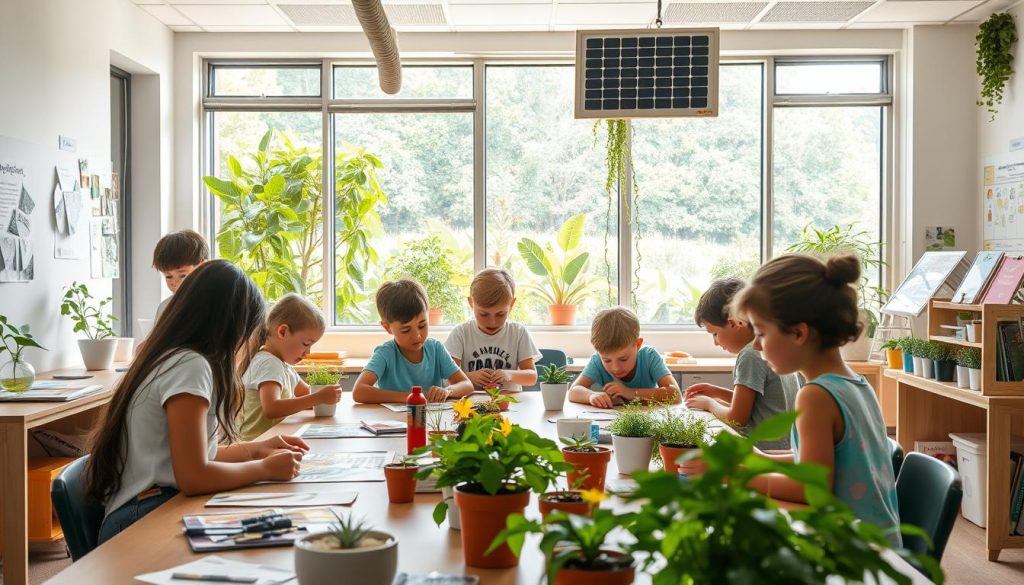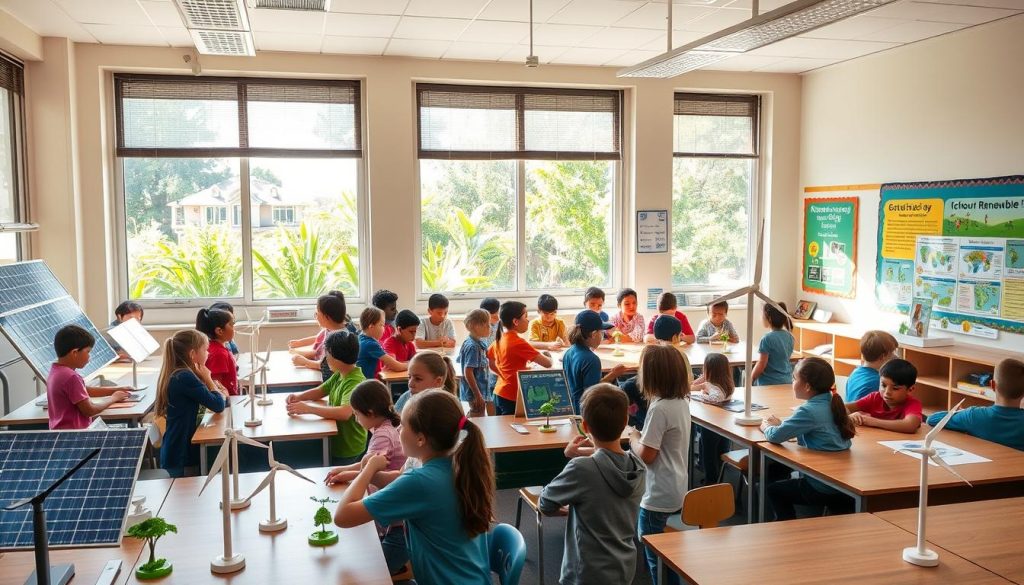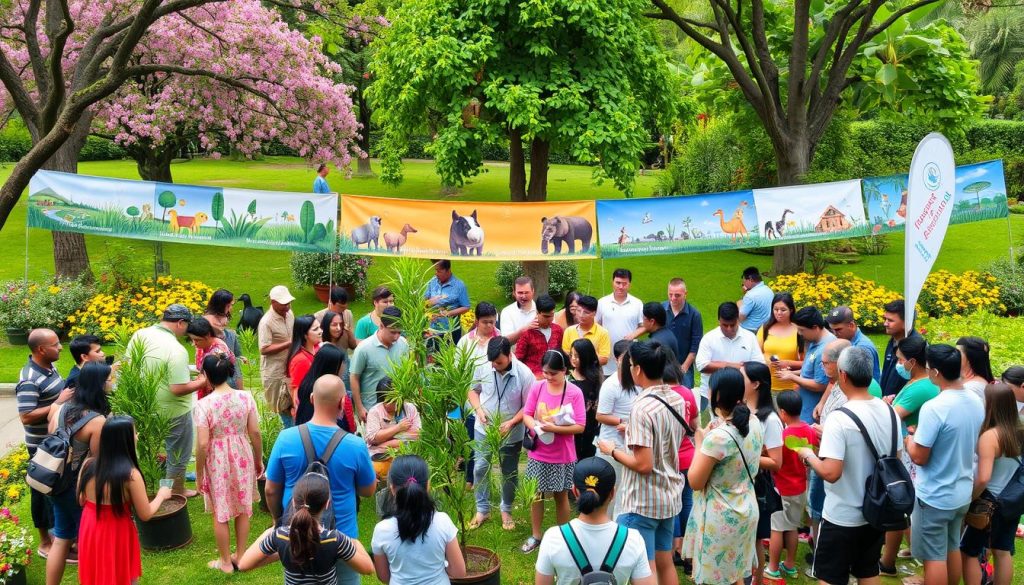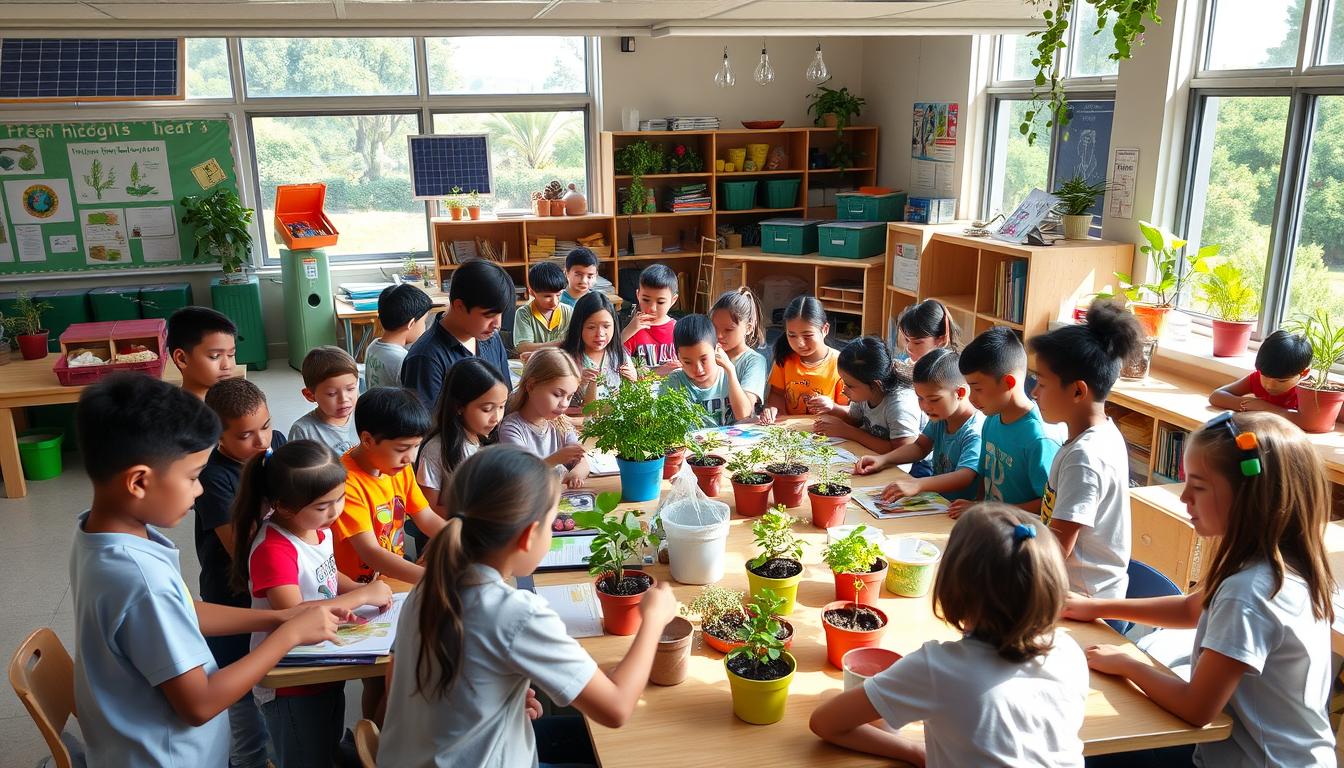In today’s world, we face many challenges. Sustainable education and awareness are key to solving them. This guide will show how education can lead to a greener future.
It’s important to teach people and communities about living sustainably. We’ll look at how education can help us adopt green practices. This guide is for anyone wanting to make our world more sustainable.
We’ll explore what sustainable education is and how it helps us grow. It’s about making a difference in our communities and finding jobs in sustainability. Let’s work together towards a better future, making choices that help our planet.
Understanding Sustainable Education
Sustainable education is more than just learning in a classroom. It’s about learning about Eco-Friendly Practices, Climate Change Education, and the Sustainable Development Goals. This way, students can help make the world a better place.
What is Sustainable Education?
Sustainable education combines learning about the environment, society, and economy. It teaches students to think critically and solve problems. This helps them make choices that support a sustainable future.
The Importance of Environmental Awareness
At the core of sustainable education is understanding our connection to the environment. Students learn about how our actions affect the planet and the need to address climate change. This knowledge motivates them to live more sustainably.
Key Principles of Sustainability
- Systems Thinking: Recognizing the interconnectedness of social, environmental, and economic systems.
- Holistic Approach: Considering the long-term implications of decisions and actions.
- Equity and Justice: Ensuring that sustainability efforts benefit all members of society, especially marginalized communities.
- Collaboration and Cooperation: Fostering partnerships and collective action to tackle complex sustainability challenges.
- Lifelong Learning: Encouraging continuous learning and adaptation as new challenges and solutions arise.
By following these principles, sustainable education prepares students to be responsible global citizens. They learn to tackle big issues like Climate Change Education and work towards the Sustainable Development Goals.
Benefits of Sustainable Education
Learning about sustainability brings many benefits. It helps us grow personally and positively impact our communities. It also opens doors to exciting careers in sustainability.
Personal Growth and Development
Sustainable education teaches us about the natural world and our place in it. It sharpens our critical thinking and environmental awareness. This knowledge helps us live more sustainably and feel fulfilled.
Community Impact
Sustainable education helps us work together to solve environmental problems. Students join local efforts, volunteer, and push for green policies. This teamwork makes our communities more eco-friendly.
Career Opportunities in Sustainability
The need for green solutions is growing fast. Sustainable education prepares us for jobs in renewable energy, urban planning, and more. These careers let us help create a better future.
Implementing Sustainable Practices in Education

It’s key to teach sustainability in schools to raise eco-aware kids. By integrating sustainability into the curriculum, we help students learn green curriculum and eco-friendly practices. These skills shape their future and benefit their communities.
Integrating Sustainability into the Curriculum
To teach sustainability, mix it into different subjects. For example, science classes can talk about renewable energy. Geography can cover sustainable urban design. Economics can look at the environmental effects of business choices.
This way, students get a full picture of why we need to care for the environment.
Practical Activities for Students
- Start eco-friendly practices like recycling, saving energy, and conserving water at school.
- Have students work on projects like solar models, upcycled art, or a school garden.
- Bring in guest speakers from community engagement groups to motivate students.
Collaborating with Local Organizations
Working with local groups boosts the effect of teaching sustainability. By collaborating with local organizations, students can join real projects and volunteer. They learn about local environmental issues and solutions.
These community engagement activities make learning more meaningful. They also teach students to care for their community and the planet.
Building a Sustainable Learning Environment

We need to make schools more eco-friendly to help our planet. By teaching green practices in class, we can lower our environmental footprint. This also encourages students to join in on Waste Reduction Initiatives and learn about Renewable Energy.
Eco-Friendly Classroom Tips
There are many ways to make classrooms greener. For example, we can use less paper and save energy. Here are some easy steps:
- Switch to digital materials to cut down on paper
- Encourage students to use refillable water bottles and avoid single-use plastics
- Start recycling and composting to reduce landfill waste
- Use natural light and energy-saving lights
Utilizing Technology for Sustainability
Today’s technology is a big help for learning about the environment. Online tools and educational software let students dive into Renewable Energy Education. They can find new ways to solve environmental problems.
Encouraging Green School Initiatives
Schools can do more than just teach green lessons. They can also lead by example with Waste Reduction Initiatives and green programs. Here are some ideas:
- Install solar panels or look into other green energy options
- Work with local groups to host environmental events
- Support student-led green clubs and projects
- Use sustainable designs in new buildings or updates
By making schools green, we teach students to care for the planet. They can then lead positive changes in their communities. Together, we can create a better future where green living is key.
Engaging with the Community

As educators, we have a chance to make a big difference. We can work with local businesses, host events, and support environmental causes. This helps spread the word about sustainable education and supports the Sustainable Development Goals.
Partnering with Local Businesses
Working with local businesses can bring many benefits. We can team up with green companies to support school projects, host workshops, or offer internships. This helps students see how climate change education works in real life.
Hosting Awareness Events
Community events are great for raising awareness and motivating people. We can hold workshops, panel talks, or movie nights about saving the environment. By inviting experts and leaders, we can inspire others to join in.
Volunteering for Environmental Causes
- Let’s organize school cleanups or tree-planting to teach students about caring for the environment.
- Encourage students to help out at local gardens or wildlife projects.
- Work with groups to help restore rivers or habitats.
By connecting with our communities, we can teach our students to be active citizens. Together, we can create a better future through education and community involvement.
Resources for Sustainable Education
I’m excited to share resources for sustainable education and awareness. This collection includes books, articles, online courses, and webinars. They offer knowledge to support your journey in environmental literacy and nature-based learning.
Recommended Books and Articles
Start with books like “Educating for Sustainability” by Daniella Tilbury and “Teaching Green” by Tim Grant and Gail Littlejohn. They give insights into making education sustainable. Also, check out articles in “Journal of Sustainability Education” and “Environmental Education Research” for the latest trends.
Online Courses and Webinars
For interactive learning, check out online courses and webinars. Platforms like Coursera, edX, and Udemy have courses on sustainability. The North American Association for Environmental Education (NAAEE) and the World Wildlife Fund (WWF) also host webinars on sustainability.
Organizations Promoting Sustainability
Join organizations focused on sustainable education and awareness. This connects you with others and offers opportunities to learn and get involved. Look into the Center for Green Schools, the Sustainable Schools Project, and the National Environmental Education Foundation (NEEF) for support and guidance.

